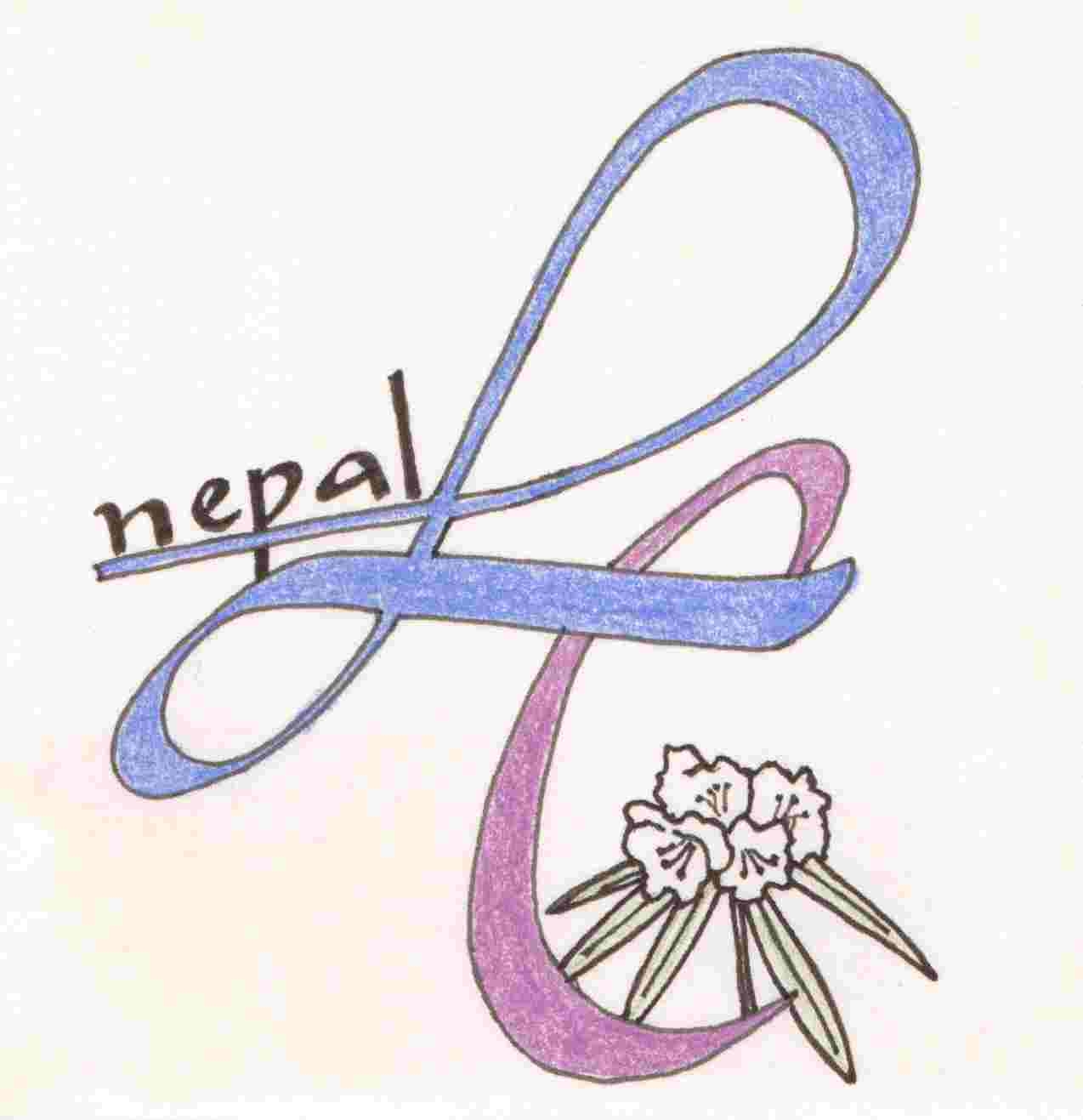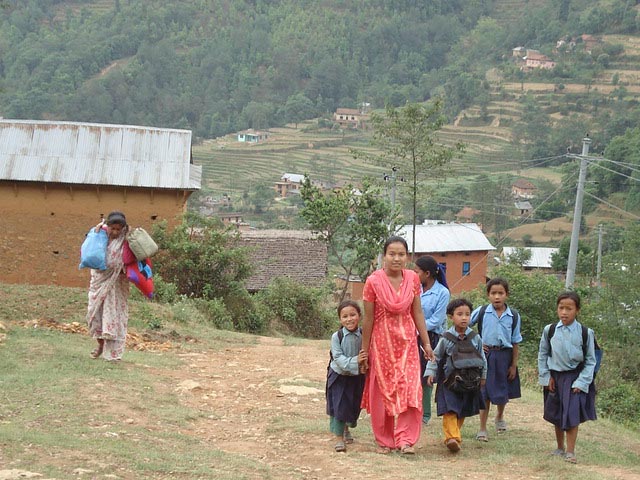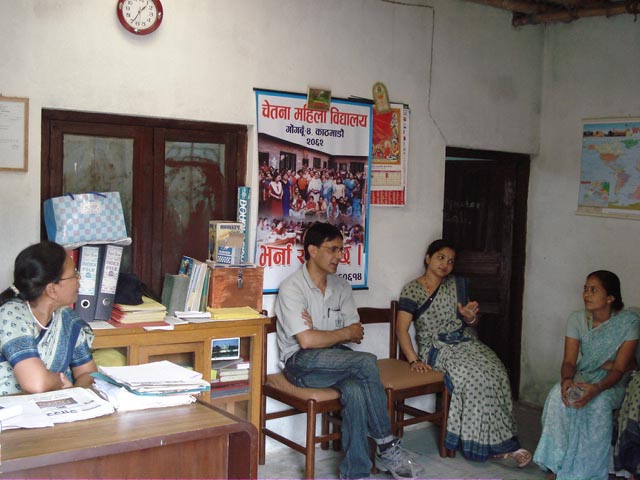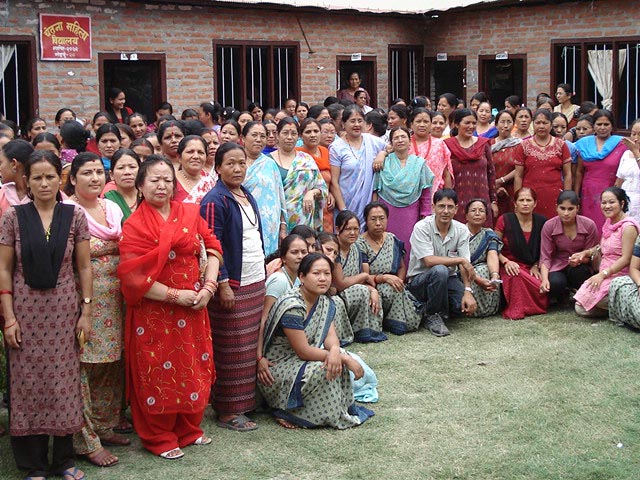 ラリグランス通信 43号
ラリグランス通信 43号 ラリグランス通信 43号
ラリグランス通信 43号**2008.5.31.発行**


ネパール共和国誕生式典 2008.4.30.
ネパールも2008年5月28日、民主主義の共和国になりました。
祝典の ために 3日間 休みになりました。
これから 国は良くなると 国民皆が思っています。
新政府をつくることで トップ3党間で議論になっています。
共和制式典集会での写真を送ります。
壇上には 第1党を勝ち得たマオイストの主席のプラチャンダとバブラム・バッタライもいます。
モティ・ギミレ 記
43号目次
| 43号 目次 | No.43 Index | |
| 1 | 新しいW.E.P(識字教室).の始まり | Next W.E.P(Woman Education Project) to start |
| 2 | セタナ婦人学校への支援 | Support for Chetana Women School |
| 3 | スマナのコラム No.8 ネパールの主婦の一日 |
Sumana's Colum No.8 Daily Life Style of Married Woman in Nepal |
| 4 | ラリグランスクラブの支援者に感謝 | Thanks for the supporters of our Laligrans Club |
| 5 | あ と が き | postscript |
![]()
![]()
|
Next WEP to start [ reported by Moti Ghimire ]
The women, who did not get an opportunity to study earlier, are studying with great interest in WEP started in Dadikot. Seeing that, the other women of a nearby village, Gundu, are also interested to study. It takes an hour, by walking, to reach the place. Since Tamang people live in that village, it is known as Tamang village. Few days before I had gone there. It is very difficult to go there in a bike, so I parked the bike and walked for about 30 minutes to reach the Tamang village. Tamangs are the Mongoloid people. They mostly live in the hilly areas. So they do farming, grow wheat ,millet, potato and raddish. Tamangs are not so forward in education and other sectors of deveopement. That is why, in Baniyatar (near Kathmandu city), with the help of Jesus community, people of Tipling village of Dhading district, are getting an opportunity for education. Tamangs are also indigenous people as Gurung, Magar, Newar. Indigenous people are those people regarded as original inhabitant of an area. There are around 55/60 houses in that Tamang village. Among those houses, a girl and a boy have passed the SLC. The girls name is Man Kumari Tamang (She is in photo ). Right now she is studying in class 12. her exams are coming near. She teaches in a school in Dadikot and reaches there by walking for an hour, everyday. She is going to teach the WEP women in Tamang village. Man Kumari’s exams are till June 15 so WEP classes in Tamang village will be stared after that. Since there is no school in that village, the women have said that they will be studying in a room of some house. Around 15 women will be studying. Is seems very reasonable to educate one of the lagging behind group (Tamang), of indigenous people. I will write more on this very soon. |
|---|
新しいWEPの始まり モティ・ギミレ記 [翻訳・・五十嵐]
若い時に勉強の機会を得られなかった婦人たちはダリコット村で行われている識字教室に大変関心を持っていると聞いていました。ダリコット村近くのゴンドゥ村の婦人たちもそのような人々です。ゴンドゥ村はダリコット村から歩いて1時間ほどの所にあります。その村にはタマン族の人々が住んでいるのでタマン村とも呼ばれています。
何日か前に私はそこを訪ねてみました。バイクで行くには大変難しくバイクを止めて30分ほどかけて歩きやっと村に辿り着きました。
タマン族はモンゴロイド系の人々です。彼らはおもに山岳の中腹地帯に住み、キビやジャガイモや大根を栽培しています。同じような環境のチプリン村の人々をイエズス会が支援し、カトマンズのバニヤタールで教育の機会を作っている理由はそこにあります。
タマン族はグルン族マガール族ネワール族のように先住民族です。先住民族の人々はその地で独自の文化を持っています。
タマン村には55〜60軒の家があります。そんな家で育った少年少女の中にもSLC試験に合格する子どももいます。新しいWEPの教師になってもらう予定のクマリ・タマンさんもその内の一人です。彼女は今12年生を終える所で最後の試験が迫っています。現在彼女は毎日1時間掛けて歩いてダリコットに通い学校の教師をしています。
彼女は卒業後はタマン村でWEPの教師になることを望んでいました。
クマリさんの試験は6月15日に終わるのでタマン村のWEPはその後始めます。村には学校がないので婦人たちは誰かの家の部屋を使って勉強したいと言っています。約15名の婦人が勉強を始める予定です。
教育の外に置かれていた先住少数民族タマン族のための識字教室は大変意義のあるものになるでしょう。


ダリコット村の学校から戻るクマリ先生。 タマン村
![]()
![]()
スマナのコラムでお馴染みのスマナ・シュレスタさんのお義母様はカトマンズで、教育を受ける機会に恵まれなかった女性達のための学校を運営されています。
入学希望者が多いのに国からのサポートはなく財政困難のためラリグランスクラブに支援を求められました。
それでモティ・ギミレさんが学校を訪問し検討した結果教師一人分のサラリーを支援することに決めました。


(1)校長室で話を聞くMr.Moti (2)生徒に質問をするMr.Moti
|
Support for “Chetana Women School” reported by Moti Ghimire
After starting women education program (WEP) in Dadhikot, through Laligurans
club, I asked those students questions like, ‘Why did not you study when
you were young?’ some said that since their parents believed that if daughters
get educated, they get spoilt, their parents did not let them study. Some
had their younger brothers and sisters to look after for which they could
not study. While some said that they did not get to study because of their
financial problems.
On
16th march, I went to visit ‘ Chetana Women School ’ in Gongobu, Kathmandu.
The students were mostly married women like in WEP. Few unmarried girls
(12-20 years) were also there. I asked them the same question that I asked
to the students to WEP and their answers were similar. This school was
established in 2006 with an aim to provide education to women who were
deprived of education due to family background, traditional beliefs, financial
problems and many other reasons. Till now, About 200 women of different status, are studying here with
full interest. Economically strong women are studying by paying Rs 250-300 as
monthly fees. But partial scholarship is provided to economically poor and Dalit
women.
There were 15/20 students who were working in others home in morning and
evening and came to study during day (11 am-3 pm). 12 years old students,
who could not study at early age due to poverty, were ashamed to attend
normal schools in grade 1, so they were very happy to come to this school.
Some students of the school (Suvadra
KC- class 5 and Bishnu Maya Sharma- class 4) said that due to financial
conditions, some of their friends are still not able to come to this school.
They said that if they got help from anywhere they would get to
study.
The
school has to pay the rent, and teacher’s salary, which the principal is finding
difficult to mange. The principal said that they have not got any help from the
government. She said that if she got financial help equivalent to one teacher’s
salary, then it would a great help in educating the older
women.
The aim of Laligurans club is the same, to help the uneducated women to
study.so I thought it would be appropriate to provide help of Rs 3000 per month
through Laligurans club, which is monthly salary of 1
teacher.
I am very impressed with the principal, Krishna Devi Shrestha’s work,
trying to help the uneducated women and we wish her work to be
successful.
|
|---|
セタナ婦人学校のための支援について モテイ・ギミレ 記 [翻訳・・五十嵐]
去年、ラリグランスクラブのダリコットでのW.E.P(識字学級)を始めるにあたり、私は生徒達に「貴女達は若い時何故勉強をしなかったのですか?」と質問をしました。すると何人かは両親が娘には教育は必要ありません。それはこどもを悪くするだけですと言って教育を受けさせてくれませんでしたと答えました。又何人かは弟や妹の世話をしなければならなかったからと言い、何人かは経済的に無理だったからという答えでした。
先の4月16日私はカトマンズのゴンゴブにある「セタナ 婦人 学校」を訪ねました。そこではダリコットW.E.P.と同じように生徒の殆どが既婚者であり12歳から20歳の未婚の女性が何人かいました。そこで私は同じ質問を彼女達にしましたが、W.E.Pの生徒と同じ答えが戻ってきました。
この学校は2006年に家庭崩壊や古い慣習、経済的理由や他の色々な問題から学校に行けなかった婦人たちのためにクリシュナ・デヴィ・シュレスタさんが作られた学校です。今ではそれぞれ問題を抱えた200人の生徒達が大変意欲的に勉強に取り組んでいます。支払い可能な生徒は月に250〜300ルピー(約500円)の授業料を払っています。しかし経済的に苦しい人やダリットの人には奨学制度を取り入れています。
15〜20人の生徒は、朝と夕方は他の家で働き11時から3時まで通学しています。これまで学校に行けなかった12歳の少女は、普通の学校の1年生に入学するのが恥ずかしいのでこの学校に来て、今では大変幸せに勉強をしています。
5年生のスバドラと4年生のビシュヌが「何人かの友人が月謝が払えなくて学校に来られないのよ。誰かの助けがあれば来る事が出来るんだけどなあ,,。」とと言っていました。
学校は借家でもあり政府からの補助金は一切ないので校長は教師の給料を払うにも四苦八苦しているそうです。校長はもしラリグランスクラブで教師の給料のために、いくらかのサポートをしていただければ婦人たちの教育のために大きな力になるのですがとおっしゃいました。
ラリグランスクラブは教育を受けてこなかった婦人たちへのサポートを目指しています。ですからクラブからCWSの教師一人分の給料にあたる月に3000ルピー(約5000円)のサポートを毎月するのは良いことと思いました。
私は校長のクリシュナ・シュレスタさんの<教育の機会を失った婦人たちを助ける仕事>に大変感銘を受け、彼女の仕事が成功すればすばらしいと思いました。
*クリシュナ校長からの感謝の手紙 *
|
Dear
Mrs. Igarashi, |
|---|
![]()
![]()
![]() ネパールでの主婦の1日
ネパールでの主婦の1日 ![]()
| Daily Life Style of a Married Woman in Nepal (Reported by Mrs.Sumana Shrestha)
A married woman, in a Newari culture, wakes up early in the morning, the one who wakes up first among the family members. She then cleans the house and then prepares to worship in the temple (like kamidana in Japan) inside the house. After worshipping, we call it pooja, she prepares tea for the family members. Tea is served to all the members and she has to do dhog (put one's forehead at the feet) to her husband and mother in law. She has to bow her father in law and other elder members in the family as well. These dhog and doing bow are the culture showing respect to her husband and parents in law and other elder members in the family. After that she also takes tea and having finished that she prepares a meal. This meal includes, dal (soup), bhat (cooked rice), tarkari (vegetable curry), achar (pickle), etc. (menu depends upon the family). She serves the meal to everyone in the family first and eats at the last. After that she is the one to wash all the dishes and clean the kitchen. Then if she has children, she makes them ready to send to the school and goes to her office if she is working outside. If she is just a housewife, then she will be inside the house busy in doing other household works. However she gets some free time after that and can pass her time freely. But in the afternoon, she again has to prepare lunch (khaja) for all . Khaja includes tea, beaten rice (chiura), noodles, bread (roti), etc. with pickles and/or vegetable curry. In the evening she prepares dinner and this includes again dal, bhat tarkari ,achar, etc. like in the morning meal. After finishing dinner, she again cleans the dishes and the kitchen. After finishing all the activities, she then goes to sleep most probably she is the last one, among the family members, to go to bed. In this way, a married woman in Nepal is a very busy person. Before getting married, as a daughter, she has more free time compared to the married woman. After being a daughter in law, her free time decreases as she has to give more time in her family. After being a mother, she has lesser free time as a burden of child rearing increases. This is the natural change in a girl from her teen age to motherhood, and I think this is true in every Asian countries, although the status of woman is different according to the countries. In a developing country like Nepal, woman still has to spend more time in the family whether she is more educated. However, the educated woman has lesser burden of household activities if she works outside. The number of families where wives and husbands share their house works and burden of child rearing are also increasing slowly especially in nuclear families. However, this is practiced less in joint families. Like other married women, I am also passing my days according to our culture and society. It has been almost one month since I came back to Nepal. It was a bit difficult to get used to the changed life style here at first, but I am slowly getting used to it. In fact, I am a Nepali and I have lived here more than 20 years before. So it just takes me some time to be acquainted to its environment. However, as a married woman, I don’t have many experiences here in Nepal. Therefore, now I am experiencing a life of a married woman which is different from my previous experiences. I am naturally dragged to be more responsible towards the family and all the family members. This might be the effect of our culture and society where we were brought up. There are some practices which we have to change slowly and there are some which should be continued in the coming years as well. |
|---|
ネパールでの主婦の1日 スマナ・シュレスタ 記 (翻訳:五十嵐)
ネパールでは主婦が家族の誰よりも早く起きます。
そしてまず部屋を掃除し、次に神棚に祈りを捧げる(プジャといいます)用意をします。
祈りを捧げたあと家族全員のためにお茶をいれ次にドグをします。
ドグというのは夫や義母の足先に額をつけて相手を敬うことです。義父にも年上の家族やきょうだいにも同じようにドグをします。
家族の最後にお茶を飲んでから朝食の用意をします。食事のメニューは通信38号のコラムで紹介したようにダルスープ・タルカリ(野菜カレー)・アチャ-ル(漬物)・ご飯などです。
主婦は家族のものに給仕したあと最後に食べます。そのあと食器を洗い台所を綺麗に掃除します。
それからもし子供がいれば学校に送り出しもし勤めがあれば仕事に出かけます。
もし専業主婦であれば少しの自由な時間もありますが家族のために家事一般をこなして忙しく働きます。
午後になるとみんなのためにカジャ(軽食)を用意します。それはお茶と野菜やピクルスを添えた干し米や麺やパンなどです。
夜になると再び朝食と同じようなメニューの夕食を用意します。
そして食器を洗い台所を掃除します。
全ての家事を終えて主婦は家族の最後に眠ります。
このようにネパールの主婦は大変忙しいです。結婚する前は娘として主婦と比べると自由な時間があります。結婚すると子供が生まれるまでは少し自由な時間がありますが子供が生まれると子育てのため自由な時間は少なくなります。これは少女から母親に移るため当たり前のことです。
国によって違いがあるでしょうがアジアの国ではそれが普通ではないかと思います。
ネパールのような途上国ではもっと女達が教育を受けなければさらに家庭に束縛されるでしょう。
しかし教育を受け外で働く女性が増えて核家族になれば家庭に束縛される時間はへり夫と家事を分け合うようになりますが家族の結びつきが希薄になるでしょう。
1ヵ月前私は出産のために帰国し、このようなネパールの主婦としての毎日を過ごしています。20年以上もネパールで生活していましたが主婦としての経験はないので最初そのような生活に慣れるのは難しいものでしたが、今ではその環境になじんできました。
私は自然に家族の人々に対する責任を以前より強く感じ取れるようになりました。これは私がネパールの社会で育ち文化を培ってきたからにちがいありません。そこには私がゆっくりと変わっていかねばならない風習があり又これから迎える母としての生活の中で続けていかねばならないものがあると思っています。
![]()
![]()
![]() 通信42号以降のサポーターの皆様
通信42号以降のサポーターの皆様 ![]()
***寄付金協力 [ 京都ノートルダム女子大学同窓会から5万円 ]
***販売購入協力 [滋賀県加賀市立加賀中学校・商いクラブの皆様 ][久堀洋子 様]
![]()
![]()
巻頭にあげたモティさんからのホットなニュースから期待を寄せる国民の息吹を感じ取っていただけたことでしょう。
こんどこそ新政府に国の安定と平和の実現を期待したいと思います。。
私たちも新しくWEPを開くことが出来ました。又、セタナ婦人学校への支援を決めました。
通信43号ではネパールの知人達のために出来るだけ英文も載せました。
| ホームページ作成 | 五十嵐園子 |
| ホームページアドレス | http://laligurans.com/ |
| 郵便振込口座 名義:ラリグランスクラブ |
00960-7-244821 |